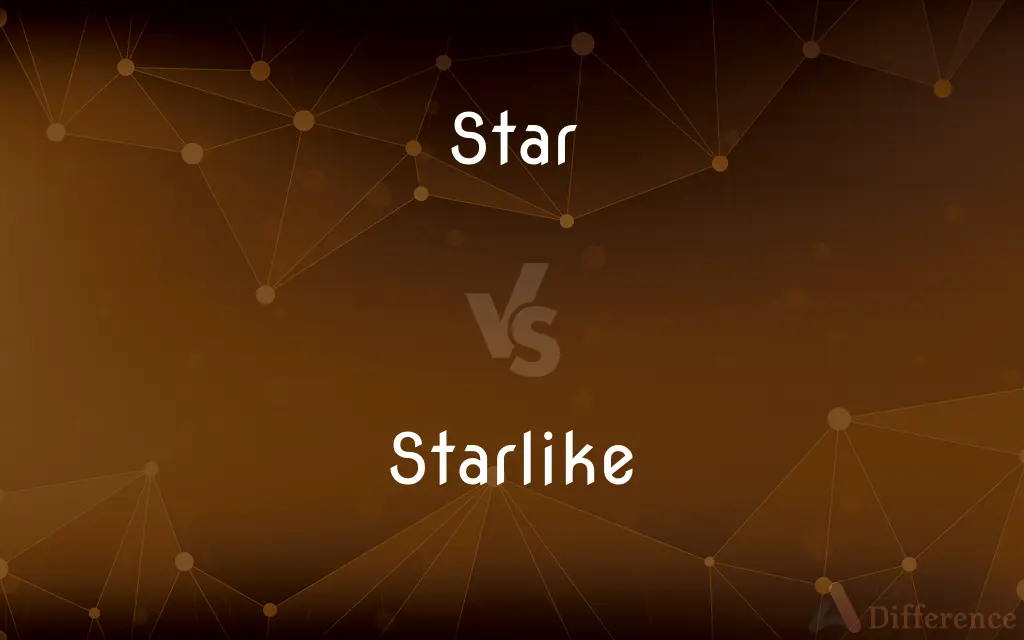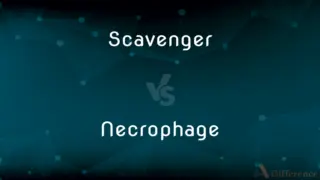Star vs. Starlike — What's the Difference?
By Fiza Rafique & Maham Liaqat — Updated on April 16, 2024
A star is a celestial body emitting light and heat from nuclear fusion, while starlike refers to objects resembling a star in appearance or quality.

Difference Between Star and Starlike
Table of Contents
ADVERTISEMENT
Key Differences
A star is an astronomical object composed mainly of hydrogen and helium, undergoing nuclear fusion to emit light and heat. Starlike, on the other hand, describes any object or feature that resembles a star, without being an actual star.
Stars are crucial in the universe, serving as the fundamental building blocks of galaxies. Whereas starlike attributes are often used metaphorically or descriptively in various contexts, such as in describing the appearance of certain minerals or decorations.
In astronomy, the study of stars involves understanding their life cycle from birth to death. Starlike qualities, however, are typically discussed in terms of visual similarity to stars, such as luminosity or shape, without the associated physical properties.
Stars can vary greatly in size, type, and color, depending on their age, mass, and temperature. Starlike objects or features, in contrast, may mimic these aspects superficially but do not share the same celestial significance.
The brightness of a star is a result of its energy output and distance from Earth. Starlike brightness, however, is often an aesthetic or artificial trait, applied to objects to give them a sparkling or standout quality.
ADVERTISEMENT
Comparison Chart
Definition
A celestial body emitting light and heat
Resembling a star in appearance or quality
Origin
Natural astronomical phenomena
Descriptive, often metaphorical
Context of Use
Astronomy, celestial navigation
Art, decoration, metaphorical speech
Physical Properties
Undergoes nuclear fusion
Does not undergo fusion; not a celestial body
Importance
Essential in the cosmic structure
Aesthetic or descriptive importance
Compare with Definitions
Star
An object undergoing nuclear fusion, radiating energy and light.
Betelgeuse is a red supergiant star visible from Earth.
Starlike
Pertaining to objects that mimic the shape or form of stars.
The child decorated her room with starlike stickers.
Star
A luminous ball of gas, primarily hydrogen and helium, held together by its own gravity.
The Sun is a typical example of a star.
Starlike
Used to describe something that emulates the quality or attributes of a star.
Her starlike performance captivated the audience.
Star
A symbol of outstanding quality or prominence in various fields.
He is a rising star in the world of architecture.
Starlike
Attributes or features that reflect a celestial or idealized quality.
He has a starlike quality to his demeanor that is quite enchanting.
Star
A celestial body visible from Earth as a point of light in the night sky.
Sirius, the brightest star in the night sky, is actually a binary star system.
Starlike
Metaphorically used to signify excellence or outstanding quality.
She has a starlike brilliance in her academic pursuits.
Star
An artistic or graphical representation of a celestial star, often with five points.
The national flag features a blue field adorned with fifty white stars.
Starlike
Resembling a star in appearance or luminosity.
The starlike reflections in the lake were caused by scattered street lights.
Star
A star is an astronomical object consisting of a luminous spheroid of plasma held together by its own gravity. The nearest star to Earth is the Sun.
Starlike
Resembling a star, especially in shape.
Star
A celestial body that generates light and other radiant energy and consists of a mass of gas held together by its own gravity in which the energy generated by nuclear reactions in the interior is balanced by the outflow of energy to the surface, and the inward-directed gravitational forces are balanced by the outward-directed gas and radiation pressures.
Starlike
Resembling or characteristic of a celebrity or leading actor.
Star
Any of the celestial bodies visible at night from Earth as relatively stationary, usually twinkling points of light.
Starlike
(geometry) Convex; having the property that any line segment joining any mapped point to a specified point in the domain lies entirely in the domain.
The growth theorem for holomorphic starlike mappings
Star
Something regarded as resembling such a celestial body.
Starlike
Resembling a star; stellated; radiated like a star; as, starlike flowers.
Star
A graphic design having five or more radiating points, often used as a symbol of rank or merit.
Starlike
Shining; bright; illustrious.
The having turned many to righteousness shall confer a starlike and immortal brightness.
Star
An artistic performer or athlete whose leading role or superior performance is acknowledged.
Starlike
Resembling a star;
They saw a starlike object in the sky
Star
One who is highly celebrated in a field or profession.
Star
An asterisk (*).
Star
The star key on a telephone
For customer service, press star.
Star
A white spot on the forehead of a horse.
Star
A planet or constellation of the zodiac believed in astrology to influence personal destiny.
Star
Stars The future; destiny. Often used with the.
Star
Outstanding or famous, especially in performing something
A star researcher.
A star figure skater.
Star
Of or relating to a star or stars.
Star
To ornament with stars.
Star
To award or mark with a star for excellence.
Star
To mark with an asterisk.
Star
To present or feature (a performer) in a leading role.
Star
To play the leading role in a theatrical or film production.
Star
To do an outstanding job; perform excellently.
Star
Any small luminous dot appearing in the cloudless portion of the night sky, especially with a fixed location relative to other such dots.
Star
(star) A luminous celestial body, made up of plasma (particularly hydrogen and helium) and having a spherical shape. Depending on context the sun may or may not be included.
Star
(geometry) A concave polygon with regular, pointy protrusions and indentations, usually with four, five, or six points.
Star
(acting) An actor in a leading role.
Many Hollywood stars attended the launch party.
Star
An exceptionally talented or famous person, often in a specific field; a celebrity.
His teacher tells us he is a star pupil.
Star
(printing) An asterisk (*) or symbol (★).
Star
A symbol used to rate hotels, films, etc. with a higher number of stars denoting better quality.
Star
A simple dance, or part of a dance, where a group of four dancers each put their right or left hand in the middle and turn around in a circle. You call them right-hand stars or left-hand stars, depending on the hand which is in the middle.
Star
(astrology) A planet supposed to influence one's destiny.
What's in the stars for you today? Find out in our horoscope.
Star
A composition of combustible matter used in the heading of rockets, in mines, etc., which, exploding in the air, presents a starlike appearance.
Star
(intransitive) To appear as a featured performer or headliner, especially in an entertainment program.
She starred in dozens of silent movies.
Star
(transitive) To feature (a performer or a headliner), especially in a movie or an entertainment program.
The show stars Calista Flockhart as a high-powered lawyer.
Star
(transitive) To mark with a star or asterisk.
Star
(transitive) To set or adorn with stars, or bright, radiating bodies; to bespangle.
Star
(intransitive) To shine like a star.
Star
One of the innumerable luminous bodies seen in the heavens; any heavenly body other than the sun, moon, comets, and nebulæ.
His eyen twinkled in his head aright,As do the stars in the frosty night.
Star
The polestar; the north star.
Star
A planet supposed to influence one's destiny; (usually pl.) a configuration of the planets, supposed to influence fortune.
O malignant and ill-brooding stars.
Blesses his stars, and thinks it luxury.
Star
Specifically, a radiated mark in writing or printing; an asterisk [thus, *]; - used as a reference to a note, or to fill a blank where something is omitted, etc.
Star
A composition of combustible matter used in the heading of rockets, in mines, etc., which, exploding in the air, presents a starlike appearance.
Star
A person of brilliant and attractive qualities, especially on public occasions, as a distinguished orator, a leading theatrical performer, etc.
Star
To set or adorn with stars, or bright, radiating bodies; to bespangle; as, a robe starred with gems.
Star
To be bright, or attract attention, as a star; to shine like a star; to be brilliant or prominent; to play a part as a theatrical star.
Star
(astronomy) a celestial body of hot gases that radiates energy derived from thermonuclear reactions in the interior
Star
Someone who is dazzlingly skilled in any field
Star
Any celestial body visible (as a point of light) from the Earth at night
Star
A plane figure with 5 or more points; often used as an emblem
Star
An actor who plays a principal role
Star
A performer who receives prominent billing
Star
A star-shaped character * used in printing
Star
The topology of a network whose components are connected to a hub
Star
Feature as the star;
The movie stars Dustin Hoffman as an autistic man
Star
Be the star in a performance
Star
Mark with an asterisk;
Linguists star unacceptable sentences
Star
Indicating the most important performer or role;
The leading man
Prima ballerina
Prima donna
A star figure skater
The starring role
A stellar role
A stellar performance
Common Curiosities
What is the significance of stars in scientific terms?
Stars are significant in science as they generate heat and light, support planetary systems, and contribute to the chemical evolution of the universe.
What defines a star in astronomy?
A star is defined as a celestial body of great mass, composed primarily of hydrogen and helium, undergoing nuclear fusion.
Why are some decorations described as starlike?
Decorations are often starlike due to their shape or their ability to reflect light, mimicking the appearance of stars.
Can a planet be starlike?
Yes, a planet can be described as starlike if it reflects light or appears bright in the sky, similar to how stars appear.
How does starlike differ from a true star?
Starlike refers to anything that resembles a star in appearance or quality but does not possess the physical properties of actual stars, such as undergoing nuclear fusion.
What is the most starlike object in our solar system?
The Sun is the most starlike object in our solar system as it is an actual star.
Is the term starlike used in professional astronomy?
The term starlike is less common in professional astronomy and more often used in a descriptive or metaphorical sense in various other contexts.
What makes a star different from a celestial body like a comet?
Unlike a comet, which is a small icy body that releases gas and dust, a star is a massive, luminous sphere undergoing fusion.
Do starlike qualities affect the understanding of real stars?
Starlike qualities can help in metaphoric or educational contexts but are distinct from the scientific properties of real stars.
How are stars classified?
Stars are classified based on their spectral type, luminosity, and size, among other characteristics.
Can an artificial object be starlike?
Yes, artificial objects like lights or decorations can be considered starlike if they mimic the brightness or shape of stars.
What role do stars play in navigation?
Stars have historically been used for celestial navigation, helping navigators determine latitude and longitude.
How does popular culture influence the perception of starlike?
Popular culture often uses the concept of starlike to denote glamour, brilliance, or outstanding quality in various contexts.
Are all stars the same color?
No, stars can range in color from red to blue, depending on their temperature and age.
How does one observe starlike characteristics in nature?
Starlike characteristics can be observed in the way certain objects reflect light or are arranged visually.
Share Your Discovery

Previous Comparison
Ameliorate vs. Mitigate
Next Comparison
Scavenger vs. NecrophageAuthor Spotlight
Written by
Fiza RafiqueFiza Rafique is a skilled content writer at AskDifference.com, where she meticulously refines and enhances written pieces. Drawing from her vast editorial expertise, Fiza ensures clarity, accuracy, and precision in every article. Passionate about language, she continually seeks to elevate the quality of content for readers worldwide.
Co-written by
Maham Liaqat













































